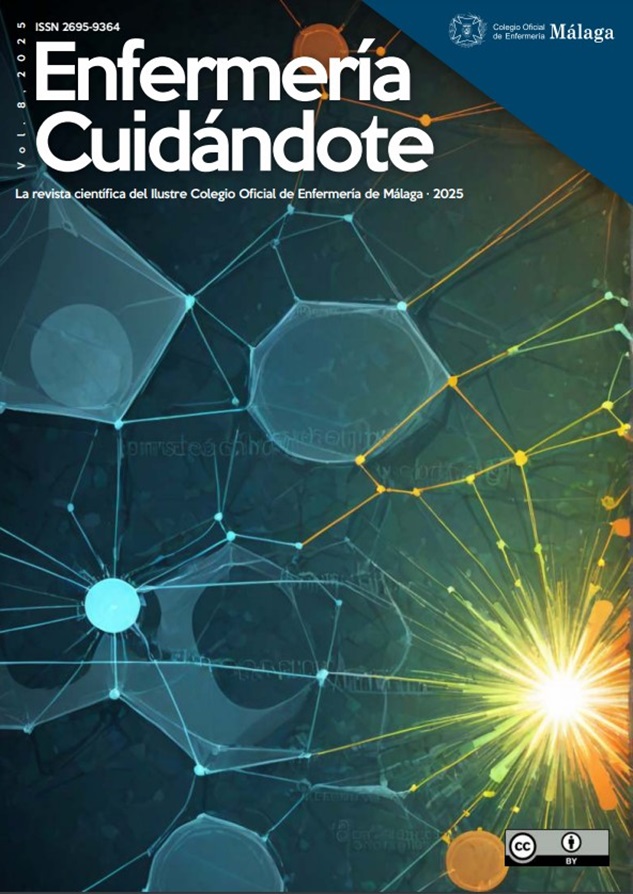Sleep hygiene in nursing students at a University in Guayaquil, Ecuador
DOI:
https://doi.org/10.51326/ec.8.2830909Keywords:
Circadian Rhythm, Sleep, Sleep Hygiene, Sleep QualityAbstract
Introduction: Sleep hygiene is a set of guidelines to have an optimal quality and quantity of sleep and is associated with different factors.
Objective: To analyze the sleep hygiene of 8th and 9th semester nursing students from a university in Guayaquil, Ecuador.
Methodology: A cross-sectional, descriptive, exploratory study was conducted to analyze sleep hygiene in nursing students, based on data obtained in the period 2022-2023. Population: 320 nursing students. Technique: Survey. Instrument: Sleep Hygiene Index.
Results: The research shows that 53% are female, aged between 20 and 25 years (47%), urban residence (79%), single (58%), work alternate shifts (morning-night) (51%). According to the categories involved in sleep hygiene, students sleep less than 8 hours a day (61%) and as a factor that triggers nighttime awakening is emotional (44%). In addition, in the application of the index, 28% wake up at different times of the day, 24% perform a previous activity that keeps them awake, and 31% go to bed feeling annoyed or stressed. With respect to the types of sleep disorders, insomnia was found to be the main sleep disturbance (31%).
Conclusion: A high score was obtained from the survey, indicating poor sleep hygiene as a result of poor quality of rest.
Downloads
References
1. Benavides-Endara P, Ramos Galarza C. Fundamentos neurobiológicos del sueño. Rev Ecuat Neurol. 2019;28(3):73-80. Disponible en: https://revecuatneurol.com/magazine_issue_article/fundamentos-neurobiologicos-sueno-neurobiological-basis-sleep/ [Consultado 23-02-2023]
2. Hospital Sanitas La Moraleja. Guía de pautas de higiene del sueño. [Madrid: Hospital Sanitas La Moraleja; Fecha desconocida]. Disponible en: https://www.hospitallamoraleja.es/pdf/pautas_higiene_sueno.pdf [Consultado 24-02-2023]
3. WHO technical meeting on sleep and health. 22-24 de Enero de 2004; Bonn: World Health Organization Regional Office for Europe European Centre for Environment and Health; 2004. Disponible en: https://www.ilo.org/media/315891/download [Consultado 24-02-2023]
4. Blanco Centurión CA. Introducción al estudio del ciclo vigilia-sueño. Rev Med UV. 2008;8(1) (Supl 2):8-16. Disponible en: https://www.medigraphic.com/pdfs/veracruzana/muv-2008/muvs082b.pdf [Consultado 24-02-2023]
5. Palazón E, Sánchez JC. Calidad del sueño del personal de enfermería. Comparativa entre profesionales con turnos de 8 y de 12 horas. Rev Enferm Trab. 2017;7(2):30-7. Disponible en: https://dialnet.unirioja.es/descarga/articulo/5920690.pdf [Consultado 15-08-2023]
6. De vital importancia una buena higiene del sueño. Noticias 365. 21 de Marzo de 2021. Disponible en: https://noticias365.com.mx/2021/03/21/de-vital-importancia-una-buena-higiene-del-sueno/ [Consultado 15-08-2023]
7. González Hernández BM, Morales López CA, Pineda Sánchez JE, Guzmán Saldaña RME. Importancia de la higiene del sueño en la vida cotidiana. Educ Salud. 2017;5(10). https://doi.org/10.29057/icsa.v5i10.2479
8. Miró E, Cano-Lozano C, Buela-Casal G. Sueño y calidad de vida. Rev Colomb Psicol. 2005;14:11-27. Disponible en: https://revistas.unal.edu.co/index.php/psicologia/article/view/1215 [Consultado 14-08-2023]
9. Pérez Olmos I, Talero-Gutiérrez C, González-Reyes R, Moreno CB. Ritmos circadianos de sueño y rendimiento académico en estudiantes de medicina. Rev Cienc Salud. 2006;4(Núm Especial):147-57. Disponible en: https://revistas.urosario.edu.co/index.php/revsalud/article/view/547 [Consultado 01-03-2023]
10. Løyland B, Angelhoff C, Kristjánsdóttir G, Sjølie H. A systematic integrative review of parents' experience and perception of sleep when they stay overnight in the hospital together with their sick children. J Clin Nurs. 2020;29(5-6):706-19. https://doi.org/10.1111/jocn.15134
11. Wang W, Du X, Guo Y, Li W, Teopiz KM, Shi J, et al. The associations between sleep situations and mental health among Chinese adolescents: A longitudinal study. Sleep Med. 2021;82:71-7. https://doi.org/10.1016/j.sleep.2021.03.009
12. Carpi M, Vestri A. The Mediating Role of Sleep Quality in the Relationship between Negative Emotional States and Health-Related Quality of Life among Italian Medical Students. Int J Environ Res Public Health. 2022;20(1):26. https://doi.org/10.3390/ijerph20010026
13. Shakeel N, Khan A, Alvi SM. Effect of Nightmare on Sleep Disturbance and Emotional Dysregulation among University Students. Int J Bus Econ Aff. 2024;9(2):52-6. https://doi.org/10.24088/IJBEA-2024-92005
14. Vilchez-Cornejo J, Quiñones-Laveriano D, Failoc-Rojas V, Acevedo-Villar T, Larico-Calla G, Mucching-Toscano S, et al. Salud mental y calidad de sueño en estudiantes de ocho facultades de medicina humana del Perú. Rev Chil Neuro-Psiquiatr. 2016;54(4). http://dx.doi.org/10.4067/S0717-92272016000400002
15. Zúñiga-Vera A, Coronel-Coronel M, Naranjo-Salazar C, Vaca-Maridueña R. Correlación Entre Calidad de Sueño y Calidad de Vida en Estudiantes de Medicina. Rev Ecuat Neurol. 2021;30(1):77-80. https://www.doi.org/10.46997/revecuatneurol30100077
16. Mastin DF, Bryson J, Corwyn R. Assessment of sleep hygiene using the Sleep Hygiene Index. J Behav Med. 2006;29(3):223-7. https://doi.org/10.1007/s10865-006-9047-6
17. Paredes Grandez JH. Calidad e higiene del sueño y somnolencia diurna en estudiantes de la carrera profesional de Medicina Humana de la Universidad Nacional de San Martín en el Semestre Académico 2018-I. Tarapoto (Perú): Universidad Nacional de San Martín – Tarapoto; 2018. Disponible en: https://repositorio.unsm.edu.pe/item/d6919ad4-722f-4bc0-93c1-3b66e7309c77 [Consultado 14-08-2023]
18. Anwer S, Alghadir A, Manzar MD, Noohu MM, Salahuddin M, Li H. Psychometric Analysis Of The Sleep Hygiene Index And Correlation With Stress And Anxiety Among Saudi University Students. Nat Sci Sleep. 2019;11:325-32. https://doi.org/10.2147/nss.s222440
19. Norma Técnica del internado rotativo en establecimientos de Salud. Quito: Ministerio de Salud Pública, Ministerio de Salud Pública; 2019. Disponible en: https://www.salud.gob.ec/wp-content/uploads/2021/06/Acuerdo_Ministerial_5286_NORMA_INTERNADO_ROTATIVO_5_SEP_2019_.pdf [Consultado 15-08-2023]
20. Díaz-Ramiro EM, Rubio-Valdehita S, López-Núñez MI, Aparicio-García ME. Los hábitos de sueño como predictores de la salud psicológica en profesionales sanitarios. An Psicol. 2020;36(2):242-6. https://doi.org/10.6018/analesps.350301
21. Flores Flores D, Boettcher Sáez B, Quijada Espinoza J, Ojeda Barrientos R, Matamala Anacona I, González Burboa A. Calidad del sueño en estudiantes de medicina de la Universidad Andrés Bello, 2019, Chile. Med UIS. 2021;34(3):29-38. https://doi.org/10.18273/revmed.v34n3-2021003
22. Monterrosa Castro A, Ulloque Caamaño L, Carriazo Julio S. Calidad del dormir, insomnio y rendimiento académico en estudiantes de medicina. Duazary. 2014;11(2):85-97. https://doi.org/10.21676/2389783X.814
23. Ball JE, Murrells T, Rafferty AM, Morrow E, Griffiths P. ‘Care left undone’ during nursing shifts: associations with workload and perceived quality of care. BMJ Qual Saf. 2014;23:116-25. https://doi.org/10.1136/bmjqs-2012-001767
24. Harvey AG. A cognitive model of insomnia. Behav Res Ther. 2002;40(8):869-93. https://doi.org/10.1016/s0005-7967(01)00061-4
25. Chang AM, Aeschbach D, Duffy JF, Czeisler CA. Evening use of light-emitting eReaders negatively affects sleep, circadian timing, and next-morning alertness. Proc Natl Acad Sci U S A. 2015;112(4):1232-7. https://doi.org/10.1073/pnas.1418490112
26. Stepanski EJ, Wyatt JK. Use of sleep hygiene in the treatment of insomnia. Sleep Med Rev. 2003;7(3):215-25. https://doi.org/10.1053/smrv.2001




















